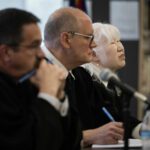Appeals court upholds contempt for defendant who destroyed phone rather than hand it over to judge
Colorado’s second-highest court agreed last week that an Arapahoe County judge properly held a criminal defendant in contempt for breaking his own cell phone to avoid handing it over to the judge as directed.
A three-judge panel for the Court of Appeals noted that even if the judge’s attempt to seize the phone was illegal, the correct procedure was for Jose Ramiro Lopez-Pizana to comply, then appeal.
When Lopez-Pizana appeared out of custody for his arraignment on Feb. 10, 2023, there was a 27-minute gap in the recording of the hearing. Four days later, when the parties reentered the courtroom, Lopez-Pizana was in custody and the participants reconstructed what happened at the arraignment for the record.
In the prosecution’s telling, there were allegations Lopez-Pizana was recording victims or other attendees on his cell phone. District Court Judge Joseph Whitfield asked Lopez-Pizana to turn over his cell phone. In response, Lopez-Pizana “proceeded to break his cell phone, shattering the glass.” Whitfield then ordered that Lopez-Pizana be taken into custody.
Lopez-Pizana’s public defender added that he objected on constitutional grounds to any attempt to look at his client’s cell phone, but did not dispute the destruction.
Whitfield then gave his account: After he heard Lopez-Pizana was allegedly using his cell phone to record, he “informed the parties that the phone would be seized.” Lopez-Pizana then snapped his phone in front of the judge. Whitfield ordered Lopez-Pizana to relinquish the phone, but he refused. After Whitfield warned Lopez-Pizana he would be arrested, Lopez-Pizana still held onto his phone.
“So, what we have are two violations,” Whitfield continued. The first was Lopez-Pizana’s use of his cell phone in violation of the courthouse rules that permit confiscation of devices, and the second was his refusal to hand over the phone.
“The Court observed the violation itself, gave (Lopez-Pizana) a warning and when the behavior, as egregious as it was, was still a noncompliance, (Lopez-Pizana) was then found in violation of the second Court order with behavior that indeed offends the dignity of this Court,” Whitfield said.
For contempt, Whitfield sentenced Lopez-Pizana to the time he already spent in custody, four days.

On appeal, Lopez-Pizana argued Whitfield’s actions were improper. The judge did not hold an evidentiary hearing, relied only on hearsay that Lopez-Pizana was recording and made an “impermissible request” to seize the phone.
“The Defendant was never advised as to the potential penalties for a refusal to comply and this violates the basic requirements of due process,” wrote attorney Andres R. Guevara.
The government countered that Whitfield properly held Lopez-Pizana in direct contempt — meaning his conduct happened in front of the judge. With direct contempt, a person’s conduct may be punished when it is “so extreme that no warning is necessary” or, in the alternative, the person acts improperly despite a warning.
There was “no dispute that Defendant violated multiple court orders in full view of the court,” wrote Assistant Attorney General Josiah Beamish.
The Court of Appeals panel largely agreed with the government. While Whitfield could not hold Lopez-Pizana in direct contempt for allegedly recording in the courtroom — because Whitfield had not seen him do so — sanctions were appropriate after Lopez-Pizana destroyed the phone rather than turn it over.
“The record shows that before holding Lopez-Pizana in contempt, the court issued a warning about the consequences of his noncompliance with the court’s order,” wrote Judge Elizabeth L. Harris in the March 28 opinion. “If he did not hear the court’s order, that would mean he coincidentally ‘snapped’ his phone for no reason, just as the court ordered it seized.”
She elaborated that even if Whitfield wrongly ordered the seizure of the phone, it did not matter because the contempt was based on Lopez-Pizana’s destruction of the phone, not the ultimate contents of it. The panel relied on a 2021 appellate decision from Louisiana that upheld contempt for a prosecution employee under similar circumstances because “no evidence was ever gleaned” from his phone.
The case is People v. Lopez-Pizana.












